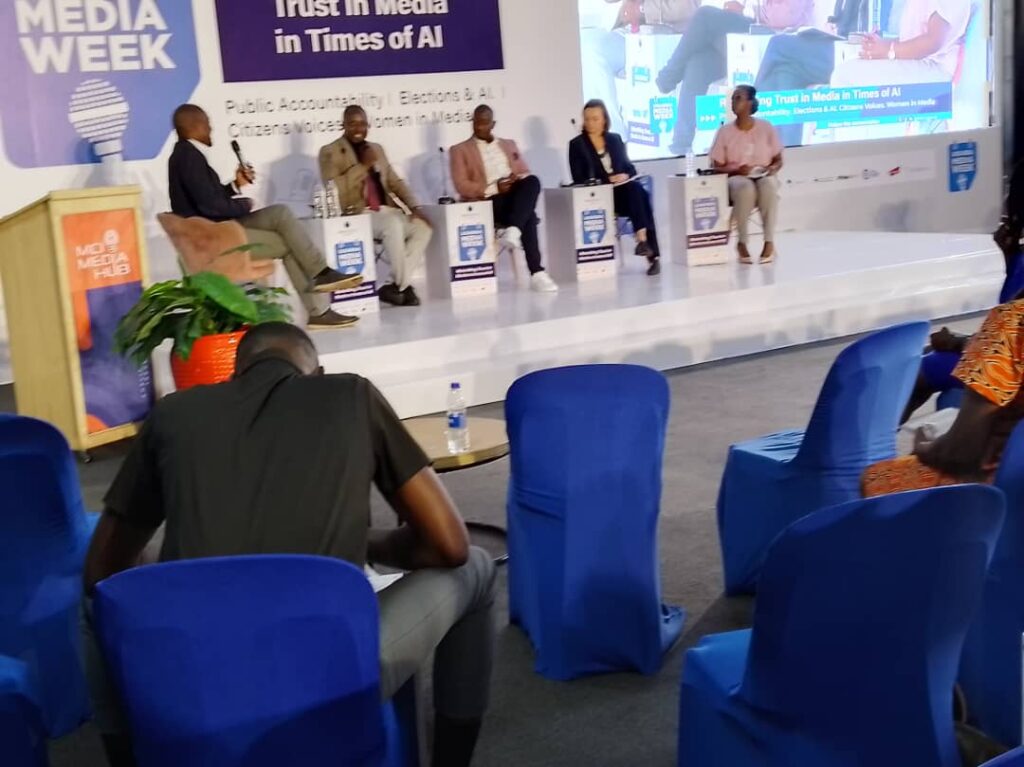By Justine Kaanyi Elizabeth
The 6th Annual Uganda Media Week Conference, held on November 7-8, 2024, brought together leading media experts and industry professionals to explore strategies for rebuilding public trust in journalism amidst the rise of Artificial Intelligence (AI). The event, hosted in Kampala, focused on the critical challenges facing the media landscape today, including disinformation, ethical journalism, and the role of AI in newsrooms.
Prof. Emily Maractho, a lecturer at Uganda Christian University, kicked off the discussions by highlighting the factors contributing to the decline in trust in the media. She attributed this erosion to economic pressures, political polarization, media ownership influences, the unchecked spread of misinformation on social media, and gaps in journalists’ training. “Trust is what keeps journalists on the streets, TVs, and all other media links,” Maractho stressed, emphasizing the foundational role of trust in journalism.
Dr. Innocent Nahaabwe, a seasoned journalist and CEO of Galaxy FM, suggested leveraging AI to remove barriers in news production and enhance journalistic practices. He argued that AI could streamline news verification processes and improve content accuracy.
Dr. George Lugalambi, the Executive Director of the African Centre for Media Excellence, emphasized the need for media houses to remain committed to truth-telling and fact-based reporting. He highlighted that upholding these fundamental journalistic values is crucial in countering misinformation.
Solomon Sserwanjja, Executive Director of the African Institute for Investigative Journalism, called for continuous training for journalists to empower them to be bold and resilient in pursuing truth. He underscored the importance of investigative reporting in holding power accountable.
Salam Adul, Head of Litigation and Legal Advisory at the Uganda Communications Commission (UCC), advocated for fairness, balance, and non-partisanship in media reporting. She urged media houses to adhere to ethical standards to regain public confidence.
Joan Comfort Balese, a practicing journalist and author, encouraged journalists to focus on personal branding, particularly their social media presence and professional appearance, to build credibility with their audiences.
The conference also tackled the pressing issue of disinformation, with Solomon Sserwanjja leading a session on its impact. He urged journalists to stand firm in their commitment to the truth, especially in an era where false narratives can spread rapidly online. Marcella Karekye, Special Presidential Assistant in charge of Communications, echoed this sentiment, noting that media often mirrors a society grappling with distorted information.
A dedicated session on *Women in Media* shed light on the unique challenges faced by female journalists, including stereotypes, online harassment, and inadequate compensation. Noeline Nassuuna, Communications Executive at Defenders Protection in Journalism, encouraged women to specialize in emerging fields like data and environmental journalism while also focusing on personal branding to navigate the industry effectively.
As the conference drew to a close, speakers collectively emphasized the need for the Ugandan media industry to embrace innovation, prioritize ethical journalism, and remain adaptable to new technologies like AI. The consensus was clear: by fostering transparency, accountability, and professional integrity, Uganda’s media sector can rebuild trust and continue to uphold democratic values.
The Uganda Media Week Conference, now in its sixth year, continues to serve as a vital platform for addressing the evolving challenges and opportunities in the media landscape, promoting dialogue and collaboration among media professionals across the country.


